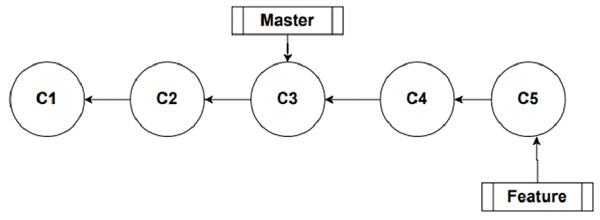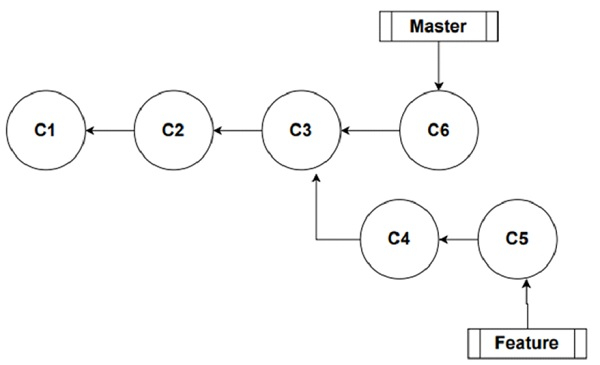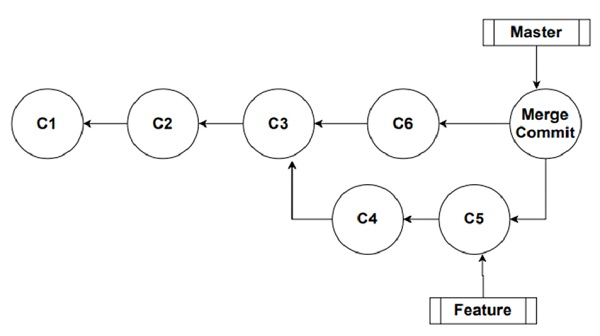什么是 Git 中的三路合并或合并提交?
让我们来看一个三路合并的例子。在这个例子中,Feature 分支比Master 分支超前两个提交。
图 1

在我们将其与 Master 合并之前,假设我们在 Master 中添加了另一个提交,如下面的图所示。
图 2

由于在 Master 分支上进行了提交,我们的Master 和Feature 分支现在都已分叉。
这意味着Master 分支中有一些Feature 分支中没有的更改。如果在这种情况下执行合并,Git 将无法将 master 指针移向Feature 分支。
如果 git 只是将 Master 指针移动到Feature 指针,那么在Master 分支上执行的最新提交C6 将丢失。
那么,如果分支已分叉,我们如何执行合并呢?
当我们想要合并已分叉的分支时,Git 会创建一个新的提交(合并提交),并将这两个分支的更改合并在一起,如下面的图所示。
图 3

它被称为三路合并的原因是合并提交基于三个不同的提交。
我们分支的共同祖先,在本例中是提交编号C3。此提交包含我们在分叉成不同分支之前的代码。
Master 分支的顶端,即在 Master 分支上执行的最后一个提交 - C6
Feature 分支的顶端,即在 Feature 分支上执行的最后一个提交 - C5
为了合并来自这两个分支的更改,Git 会查看三个不同的快照 - 之前的快照和之后的快照。基于这些快照,Git 通过创建名为合并提交的新提交来合并更改。
示例
$ git init $ echo one>1.txt $ git add . $ git commit -m 'c1' $ echo two>2.txt $ git add . $ git commit -m 'c2' $ echo three>3.txt $ git add . $ git commit -m 'C3' $ git branch feature $ git switch feature $ echo four>4.txt $ git add . $ git commit -m 'c4' $ echo five>5.txt $ git add . $ git commit -m 'c5' $ git switch master $echo six>6.txt $ git add . $ git commit -m 'c6' $ git merge feature $ git log --oneline --all --graph
输出
hint: Waiting for your editor to close the file... unix2dos: converting file E:/git_clone/test_repo/.git/MERGE_MSG to DOS format... dos2unix: converting file E:/git_clone/test_repo/.git/MERGE_MSG to Unix format... Merge made by the 'recursive' strategy. 4.txt | 1 + 5.txt | 1 + 2 files changed, 2 insertions(+) create mode 100644 4.txt create mode 100644 5.txt * e1ce060 (HEAD -> master) Merge branch 'feature' |\ | * 3435c89 (feature) c5 | * 7e7761b c4 * | 5618675 c6 |/ * 6ad93bf C3 * 9031c20 c2 * 3f68f83 c1

广告

 数据结构
数据结构 网络
网络 关系数据库管理系统 (RDBMS)
关系数据库管理系统 (RDBMS) 操作系统
操作系统 Java
Java iOS
iOS HTML
HTML CSS
CSS Android
Android Python
Python C 编程
C 编程 C++
C++ C#
C# MongoDB
MongoDB MySQL
MySQL Javascript
Javascript PHP
PHP